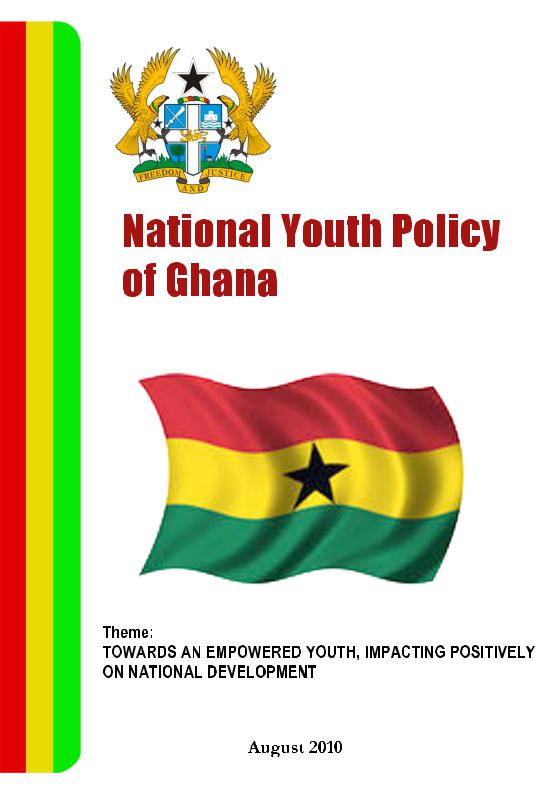
nypolicy
.pdf

National Youth Policy of Ghana
Theme:
TOWARDS AN EMPOWERED YOUTH, IMPACTING POSITIVELY
ON NATIONAL DEVELOPMENT
MINISTRY OF YOUTH AND SPORTS
August 2010
i

|
|
CONTENTS |
|
FOREWORD TO NATIONAL YOUTH POLICY ....................................... |
iv |
||
EXECUTIVE SUMMARY..................................................................................... |
1 |
||
NATIONAL YOUTH POLICY ............................................................................... |
3 |
||
|
1.0 |
RATIONALE FOR YOUTH POLICY .......................................................... |
3 |
|
2.0 |
OVERVIEW........................................................................................... |
4 |
|
3.0 |
DEFINITION OF YOUTH AND GHANA’S YOUTH PROFILE...................... |
5 |
|
4.0 |
CHALLENGES FACING THE YOUTH........................................................ |
6 |
5.0 |
POLICY FRAMEWORK .............................................................................. |
7 |
|
|
5.1 |
The Policy Vision.................................................................................. |
7 |
|
5.2 |
Principles And Values .......................................................................... |
8 |
6.0 |
POLICY PRIORITY AREAS........................................................................ |
10 |
|
|
6.1.1 Education and Skills Training ............................................................. |
10 |
|
|
6.1.3 Science, Research and Technology.................................................... |
10 |
|
|
6.1.4 Information and Communication Technology (ICT)........................... |
11 |
|
|
6.1.5 Youth and Employment..................................................................... |
11 |
|
|
6.1.6 Entrepreneurial Development........................................................... |
11 |
|
|
6.1.7.Youth in Modern Agriculture............................................................. |
12 |
|
|
6.1.8 Gender Mainstreaming ..................................................................... |
13 |
|
|
6.1.9 Environment...................................................................................... |
13 |
|
|
6.1.10 Health, HIV and AIDS....................................................................... |
13 |
|
|
6.1.11 Networking and Partnership........................................................... |
14 |
|
|
6.1.12 Mentoring....................................................................................... |
14 |
|
|
6.1.13 Arts and Culture ............................................................................. |
15 |
|
|
6.1.14 Governance, Democracy, and Leadership ...................................... |
15 |
|
|
6.1.15 Sports and Recreation .................................................................... |
16 |
|
|
6.1.16 Youth in Conflict Prevention and Peace Building............................ |
16 |
|
|
6.1.17 National Youth Week...................................................................... |
17 |
|
ii

6.1.18 Youth and Vulnerability .................................................................. |
17 |
|
6.1.19 Youth, Patriotism and Volunteerism............................................... |
18 |
|
6.1.19.1 Nationalism and Conscientization of the Youth ........................... |
18 |
|
7.0 IDENTIFIABLE GROUPS UNDER THE NATIONAL YOUTH POLICY ................. |
19 |
|
8.0 RIGHTS OF THE YOUTH.......................................................................... |
20 |
|
9.0 OBLIGATIONS ........................................................................................ |
20 |
|
9.1 |
The State ........................................................................................... |
20 |
9.2 |
Parents/Guardians............................................................................. |
21 |
9.3 |
The Youth .......................................................................................... |
21 |
9.4 |
The Private Sector ............................................................................. |
22 |
9.5 |
Civil Society Organizations/Institutions............................................. |
22 |
9.6Religious Organizations, Traditional Authorities and
|
|
Socio-Cultural Groupings................................................................... |
22 |
|
9.7 |
International Organizations............................................................... |
23 |
|
9.8 |
Development Partners and Donor Agencies ..................................... |
23 |
10.0 |
IMPLEMENTATION MECHANISMS.......................................................... |
24 |
|
|
1.0 |
MONITORING, EVALUATION, AND REVIEW OF POLICY ..................... |
26 |
|
11.3 |
Action Plan ........................................................................................ |
26 |
12.0 |
CONCLUSION......................................................................................... |
26 |
|
iii

FOREWORD
The Youth all over the world have been acknowledged as an important human resource with the potential to contribute significantly to national development and therefore must be accorded such recognition and be involved in national development by government and other stakeholders.
Indeed the new Millennium provides the youth the opportunity for a new beginning for them to be involved in national development since they are potential leaders of any Nation. Youth development however does not occur in a vacuum. The Youth must prepare and be prepared to take up this leadership role.
Government, the Youth themselves, Parents, Civil Society Organisations, Development Partners and the Media are enjoined by the Constitution and moral suasion to take up this responsibility and discharge it to the best of their ability.
A well formulated Youth Policy such as this one, which is the outcome of a wide consultative process provides the conceptional framework to direct major stakeholders, including particularly the Youth themselves, to work assiduously towards Youth participation in national development.
The zeal and immeasurable commitment to youth development shown by the current Government under the able leadership of His Excellency,
iv

The President, Professor John Evans Atta Mills, supported by Academia, Development Partners and the Media among others is commendable.
It is my expectation that as the ultimate beneficiaries of this policy, the youth will be challenged enough to maximise the use of this policy to justify their deserved and rightful inclusion in national development and also their full empowerment.
AKUA SENA DANSUA, (MP)
MINISTER FOR YOUTH AND SPORTS
AUGUST 10, 2010
v

EXECUTIVE SUMMARY
The youth are a valuable resource and they must be harnessed for national development. The existence of a comprehensive National Youth Policy enables the Government to engage the youth and other stakeholders in meaningful partnership to develop appropriate interventions and services for youth empowerment and development.
This National Youth Policy has as its theme “Towards an empowered youth, impacting positively on national development”. It is intended to provide guidelines for all stakeholders involved in the implementation of policies, programmes and projects for the development of the youth. It is also intended to help the country demonstrate its commitment to all international conventions and charters it has signed relating to the youth.
The policy is set out in 12 (twelve) sections which can be summarized as follows:
•Sections 1 and 2 deal with the rationale and overview of the Youth Policy seeks to achieve.
•Section 3 defines ‘Youth’ and provides the profile of the youth in Ghana. Section 4 identifies the main challenges of youth in Ghana which the Policy seeks to address.
•Section 5 provides the Policy Framework for Youth activities, as well as the Vision and the underlying Principles and Values.
•Section 6 details the nineteen (19) policy priority areas to be implemented to attain the policy objectives.
•Section 7 specifies the nine (9) broad special Youth groups to which the implementers of the Policy must give special emphasis and attention. Sections 8 and 9 detailed the Rights, Responsibilities and Obligations of
1

the Youth on one part, and the Obligations of stakeholders to the Youth of Ghana on the other part.
•Section 10 provides a framework for collective action and coordination of strategies for youth development among government institutions, nongovernmental organizations (NGOs), and youth organizations, as well as, other stakeholders for youth empowerment.
•Sections 11 and 12 deal with implementation, monitoring and future review of the Policy.
•The Policy conforms to present international policy trends and reflects shades of political and social experiences in the country.
•The participatory process used in formulating this Policy will continue to be the main approach in implementing, monitoring and evaluating the various aspects of the Policy and in its subsequent revision.
2

NATIONAL YOUTH POLICY
1.0RATIONALE FOR YOUTH POLICY
1.1The youth constitute the true wealth and future of our country. Addressing their hopes and aspirations must be an integral part of our socioeconomic development efforts. Successive governments have over the years, realized the need for policies that would empower the youth for effective participation in the national development agenda.
1.2A National Youth Policy provides the opportunity for Government to engage the youth and other stakeholders in meaningful partnership to develop appropriate interventions and services for youth empowerment.
1.3The concept of empowerment involves the creation of a congenial environment for equipping the youth with knowledge, skills, attitudes, values and ethics. Provision of resources required to enable them contribute to the economic, social, and cultural advancement of themselves, their families, and the nation as a whole becomes a major responsibility of governments and other stakeholders.
1.4Consequently, youth empowerment shall involve the process of preparing young people to meet the challenges of adolescence and adulthood through series of activities, and experiences, which help and motivate them to become socially, morally, emotionally, physically, economically independent and cognitively competent as well.
1.5The National Youth Policy is intended to provide guidelines and direction for all stakeholders involved in the implementation of policies, programmes and projects for the development of the youth. It is also intended to help the country demonstrate its commitment to all international conventions and charters it has signed affecting the youth.
3

2.0OVERVIEW
2.1The Youth are a major source of human capital and key agents for sociocultural, economic, and political development as well as technological innovation worldwide. Their imagination, ideals, energies and vision are essential for the continuing development of societies. Their training, development, intellectual perspectives and productive ability are key determinants of the progress and future of societies.
2.2The development and empowerment of the youth is imperative for the attainment of national developmental goals. It is therefore important to take account of the youth in our national developmental efforts by;
•providing opportunities for learning and acquiring life-long skills.
•affording them an appreciation of decision making processes and how these decisions affect them.
•instilling in them the communal spirit.
2.3In spite of the recognition of the youth as a valuable resource for the advancement of the Ghanaian society, a large number of them are affected by such factors as poverty, social exclusion and economic marginalization.
2.4As its agenda for the youth, Government promised the effective mobilization of the youth, the productive engagement of their talents and energies and the creation of an environment enabling the youth to realize their full potential. This policy document is to serve as the vehicle for empowering the youth for national development.
4
